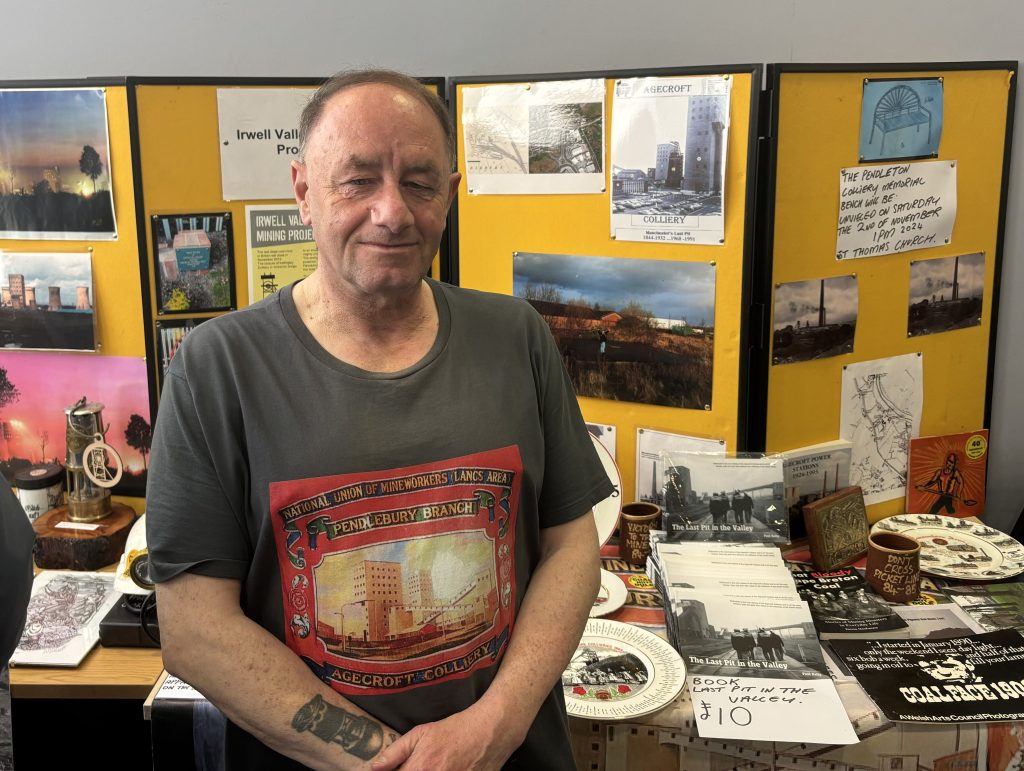
The thirteenth edition of the Salford History Festival returned this past weekend providing locals with an insight to the city’s past.
The festival that has run yearly, has been able to act as a fantastic eye-opener into why so many adore the place that we call home.
The event acts a reminder of the past, and is fantastic celebration of the hertiage that has developed over time.
It was predictably bustling again at the Salford Civic Centre, Swinton, and wading through the room was a struggle with hundreds of Salfordians flowing in and out throughout the day.
Stalls were situated against every wall possible, most exploring specific locations of Salford in greater depth.
The primary themes focused on the working class movement that has breathed significance in the families that live in the city today.
Sat outside was a mid-sixties front-engine bus in Salford green, basking in the Swinton Saturday sun, grabbing the attention of anyone passing.
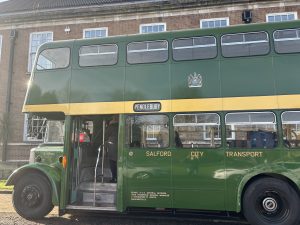
Two talks took place, first by local historian, Tony Flynn, and followed by Barrie Eckford, who has been campaigning for a memorial for Salford volunteers who fought in the Spanish Civil War in the late thirties.
Rugby League clubs Salford Red Devils and Swinton Lions also had stalls at the event, celebrating their rich rivalry and history with memorabilia and retro items.
Organiser of the event, Paul Kelly might be the most celebrated for sustaining the festival, despite the discontinuation of funding from Salford City Council.
The support is still strong from the community for the event, represented in the turnout.
When speaking to Paul, it is easy to understand how important this event is to Salford and the reason he started it in the first place.
As he said: “It’s been going now for 13 years in present form. It was run many years ago by Salford Council, but because of budget, people are not wanting to do it. It was sort of left for dead basically.
“We picked it up about 13 years ago, primarily because of the mining stuff. And then people started talking about history and saying ‘Manchester’s got a history festival, why haven’t we got one’ – so I said right, we’ll do one.
“The first one we did at St. Augustine’s church, the Miners Cathedral in Pendlebury. It’s gone really fast, and gone from strength to strength every year.
“The other year just before COVID there were 500 people, and I think there is going to be quite a big attendance here today. It is a really interesting place to come and for people to enjoy,” Paul added.
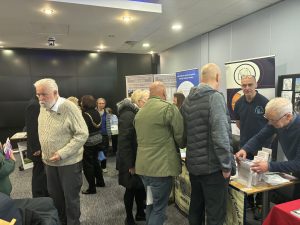
Despite the council becoming unable to fund the event themselves, they have still greatly supported the event, which Paul attributed credit towards.
“We applied for this room for free from the council, who have been really good for us,” Paul commented.
“We’ve had councillors today. The ceremonial mayor opened the proceedings, but they have been really phenomenal.”
Paul had a stool of his own, which was decorated with the history of Agecroft Colliery, a coal mine in Pendlebury which spanned between 1844 and 1991, before being redeveloped into a business enterprise park.
When asked about the importance of history in Salford, and maintaining historical areas that have since been regenerated, Paul was defiant that the city must keep references to the past.
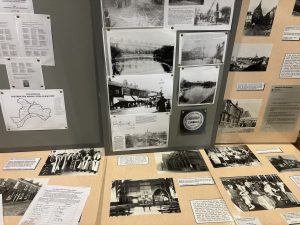
“This is working-class history. Nobody remembers we had a coal mine 30 years ago in Salford, we had the docks 20 years ago and all the industry with it, the steel works, iron works and everything to do with the industry in Salford.
“We should remember that part because that’s what brought us here today,” Paul noted.
“Nobody will know where Agecroft Colliery is now, there is no trace of it apart from a memorial. We’ve not got many [historical] buildings left anyway.
“I mean we’ve done more damage in the last few years, buildings have been flattened all over the place which we have tried to save.
“We had a problem looking for a place to hold the festival. You’ve got nowhere to go. The buildings have been corporatised.”
With much of Salford’s remaining historic architecture under threat from new housing or industrial parks, the focus on the event today was directed towards protecting what is left, which Paul was keen to pass on to children.
“We’re not going to be here forever. We’re getting older, a lot of these societies, in general, are getting older. We definitely need the youth, for children to come forward,” Paul said.
“Please come along and check out your family history for a start. See if your Dad or your Granddad was a coal miner or an engineer, and if you’ve been here for generations. You’ll learn a lot about your family,” he continued: “I love everything to do about why you’re here, where you came from, and how you got here.”
Encouraging children to become interested in Salford’s history was warmly shared by the Chairman of the Salford Local History Society, Don Rainger, who spoke in depth about the importance of Salford in a wider context.
Don said: “Salford is a great city, it has a long history and an important part in the industrial sector of the country.
“It’s important that we try to encourage people, especially younger people, because there are people of a certain age in here. We would like to see more emphasis on bringing the younger element into the heritage activities.
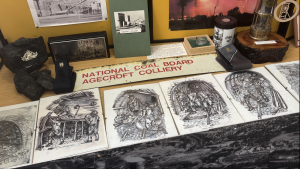
“It is very important that the heritage of this city is passed down to keep the history alive on a personal level,” Don stated.
In a greater continuation of a discussion on the heritage buildings in Salford, Don emphasised the cruciality of protecting Salford’s history.
“Only about forty or fifty years ago, the council almost voted to have Ordsall Hall knocked down.
“You think of 500-odd years of history being bulldozed down and the mindset of the councillors who wanted that to happen, and now you go down there – all the activities and the renovation to the tune of £6.5 million – It doesn’t bear thinking about the things that have been lost. It is a great shame.”
When speaking about the event as a whole, Don spoke invigoratingly, expressing gratification for the community spirit and sharing joy for Salford.
“It is encouraging to see people here, talking to each other, the links and the friendships which people develop.
“You might not see anybody for twelve months then they will come up and tap you on the shoulder – that is really nice.”
The video below shows an insider into the festival and some of the many stalls that were set up.
The event typically takes place annually on the last Saturday of October, and will unquestionably be returning in 2025.















Recent Comments